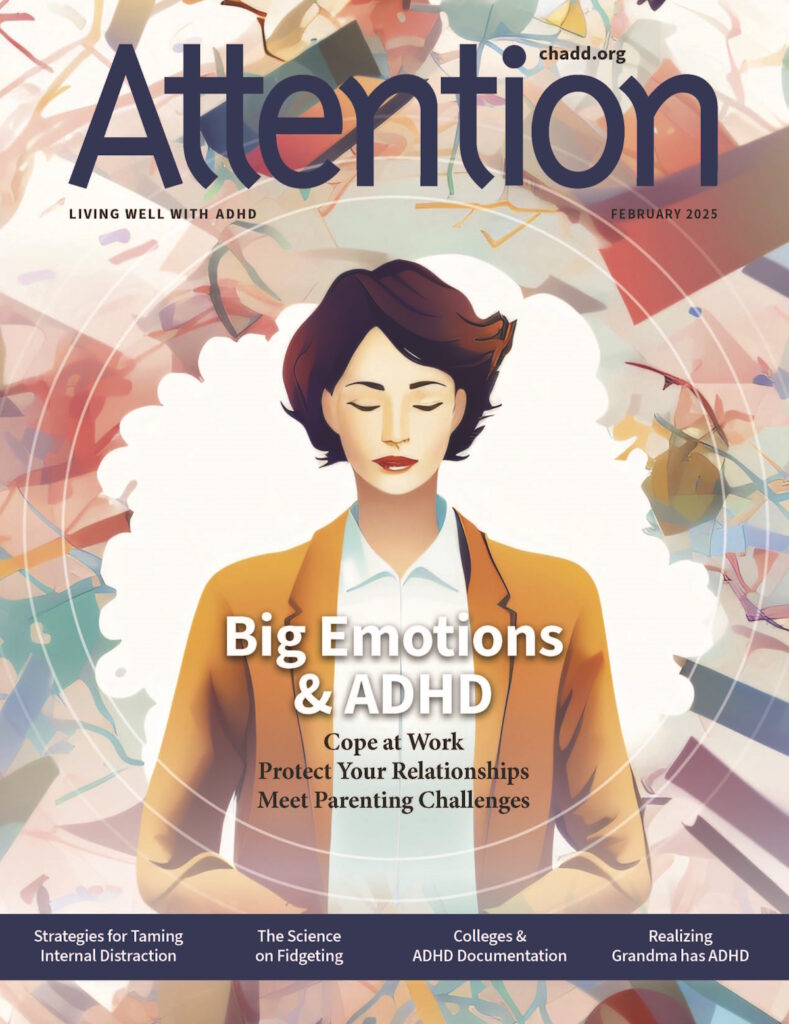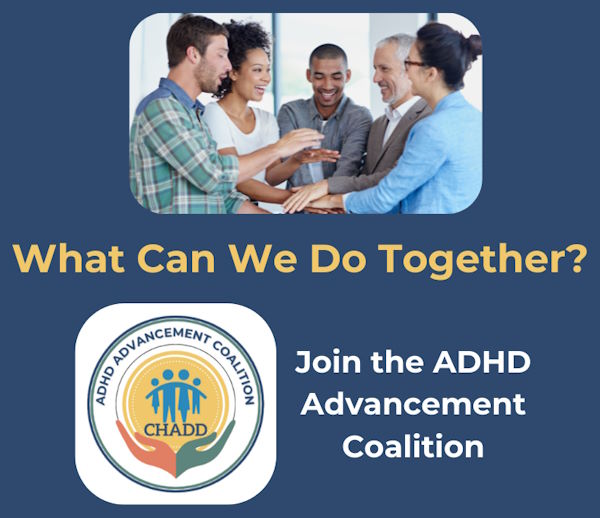
The CHADD Young Scientist Research Awards recognize, and honor the achievements of emerging researchers in ADHD. Two awards are available: one for current doctoral students, and one for researchers who have completed a doctoral degree in the past three years. Applications are due April 1, 2025.
Learn MoreADHD in the News 2025-03-27
March 27, 2025ADHD may be associated with an increased risk of dementia
TikTok is full of ADHD advice — just don’t trust it for a diagnosis
7 Questions About A.D.H.D. Drugs, Answered
ViewADHD Weekly, March 20, 2025
March 20, 2025Ask the Specialist: Should We Include Medication in Our Child’s ADHD Treatment?
Home to Stay—For Now
Ask the Expert: The Role of Speech Therapy in ADHD Management
View
Attention Magazine
Recognized for its excellence, CHADD’s bimonthly magazine is rich in practical information, clinical insights, and evidence-based strategies for managing ADHD.
LEARN MOREJoin the online community for parents of children with ADHD

Adhd e Dop

PLEASE HELP: My 17 yo Ruining His Life
Hello, I am at the end of my rope and clueless about what to do. My 17 son with ADHD has been on a downhill ride for 2 years and is ruining any possibility of a life for himself. He sees a counselor regularly but it does not seem to be helping. He is due to graduate from high school in 2 months, is failing 2 classes, has been suspended 3 times f

10 year old having trouble making friends
Hi. I have a 10 year old daughter who has ADHD and she has a hard time making friends at school. She is new to the school this year, but has not been able to find a friend. She is a nice girl and really wants to have a friend. does any one have a child going through the same thing? I am interested in connecting. I'm in the aurora Co area. Tha

Struggling with homeschooling and adhd

Participants Needed for ADHD & Exercise Study!
We are recruiting children aged 8-11 with ADHD for a research study at Teachers College, Columbia University! This study examines how aerobic exercise affects executive functions in children with ADHD.
What’s Involved?
1 familiarization visit (1 hour)
3 exercise visits (1.5 hours each) over a month
Running/walking on a treadmill

Issues in middle school
Hi Folks, My son is 11 years old and in the 5th grade. Unfortunately our district ran out of room in the elementary schools so 5th grade is now part of middle school. My son has ADHD and Tourette’s and was previously medicated in 1st-2nd grade. We seriously tried all medications and then went meds free in 3rd-4th grade and part of 5th. My son h

Child recently diagnosed with adhd
Hi, I'm a mother to a sweet 9 yr old boy, who was recently diagnosed with ADHD. So this is unfamiliar territory for me. I've joined this group to hopefully get helpful information on how to navigate/ help our son and us with this recent diagnosis. In the past year we have noticed that he has a hard time focusing and sitting still with certain task

ADHD Weekly -- Should We Include Medication in Our Child’s ADHD Treatment?
Question to CHADD Helpline: My son’s mother and I preferred behavioral management to address our son’s ADHD symptoms. We have been diligent in schedules, routines, and reinforcing the good behaviors we see. But no matter how hard we try and how well we co-parent, it only seems to help so much, and then there are meltdowns at home and calls from the

Seeking Advice on Shilajit
Hello everyone, I've recently started using Shilajit Ireland to improve my sleep and manage stress, and the natural benefits have been impressive so far. I'm still exploring the best sources for this supplement. For those who use Shilajit Ireland: Do you have a preferred brand or store? Are there specific labels like organic or third-part

Participants Needed for ADHD & Exercise Study!
We are recruiting children aged 8-11 with ADHD for a research study at Teachers College, Columbia University! This study examines how aerobic exercise affects executive functions in children with ADHD.
What’s Involved?
1 familiarization visit (1 hour)
3 exercise visits (1.5 hours each) over a month
Running/walking on a treadmill
Join the online community for adults with ADHD

Does anyone have this issue at work?
I have one thing to do, and one thing only, and it feels like I can do more things but nobody likes to show me how to do anything . I feel it is because of my ADHD. It's like it is easier to leave me on the thing I know than to take the time to show me something else. Does anyone ever feel this way?

31st March 2025 deadline to complete form to stay on adult ADHD services for South West England - please spread this info far and wide!
Hi all, I came home from work today to find a letter waiting for me from Bath and North East Somerset, Swindon and Wiltshire Integrated Car Board stating that I have until 31.03.2025 to complete a form to stay on the service pathway. It states that the adult ADHD services provider is changing and that there are services anyone can access even pri

ADHD diagnosis after 50
I'm in my 50's and have ADHD, the inattentive type. As a child i had all the textbook symptoms of ADHD, they called it chronic motoric hyperactivity. Both of my children display similar symptoms and strugle in school, and so I was looking for ways to help. I realized that my childhood ADHD did not go away, it just evolved in to the adult version

ADHD negative
What to do when you have all the symptoms but you pass the ADHD testing with NO diagnosis. My working memory probs and procrastination and all over the place attention as well as multiple executive function challenges is NOT nothing. Receiving no diagnosis and to be told I’m fine when I know I’m not is disheartening. The testing person that told

Doing my best...I think
Hi, I was diagnosed with ADD and Depression in high school, but didn't have anyone to guide me through trying medications, or anything else really. What I was taking took my emotions away, so I stopped taking anything for several years. In my thirties I was diagnosed with ADHD and Dysthymia, which made so many things in my life make sense, but even

Home to Stay—For Now
More adults are living in multigenerational homes. What can you do to make it a better experience when one or more family members have ADHD? Keeping for useful tips... https://chadd.org/adhd-news/adhd-news-adults/adhd-weekly-home-to-stay-for-now/

Help need password reset
I need to reset my password, lost my old one. I cant figure out how on this site..Can someone advise please?

Interrupting is a thing
I have a thing for interrupting. Therapist said raise your hand..that doesnt work. I feel like a school kid I am an adult. I am kind of a odd combo..I made great grades in school//scholarships. great with finances etc..but I struggle with simple things..Like if I am asked to take the garbage cans to the road and get the mail..I only get the mail..I

Does my son have ADHD?
Hi everyone, I apologize in advance if this is not the right forum for this question. My almost-5- year-old who is in Pre-K goes to public school in New York City. He has had a rough past few weeks with trouble following directions and being disruptive. Apparently, he walks around in class in the middle of activities and goes to the restroom to

noisy sound
hi I have a high sensibility for sounds. Not all but most of all the kind of rumbles. I cannot sleep if there is a fridge or a fan or an heat pump. Anyone else have the same? Are there earplugs that can help? Thank you :)










